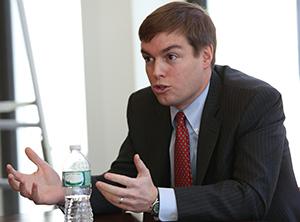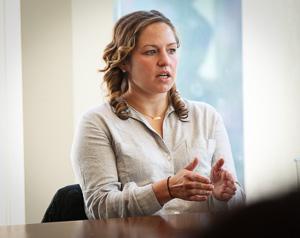Careers in National Security Law: A Tale of Two Attorneys
New York, October 27, 2015—Two national security lawyers working for the U.S. Department of Justice shared career advice and stories with students when they returned to Columbia Law School as alumni. The event was organized by the School’s Social Justice Initiatives, which provides career services and programming for students and interested in public interest, government, and legal volunteer work.
“I took my national security law seminar in this room,” recalled Richard Scott ’05, now the Deputy Chief of the Counterintelligence and Export Control Section of the Justice Department’s National Security Division (NSD), where he focuses on investigating and prosecuting counterintelligence matters, including espionage and economic epsionage. He took that seminar back in 2004, two years before the Justice Department created the NSD to combat terrorism and other threats to national security.
| Richard Scott '05, top, and Colleen Garcia '13, both lawyers with the Justice Department's National Security Division, returned to the Law School to share career advice with students. |

